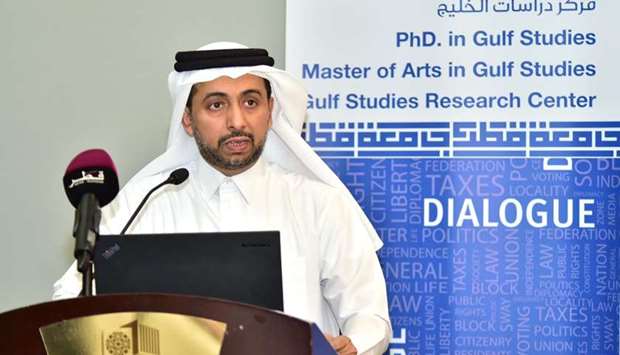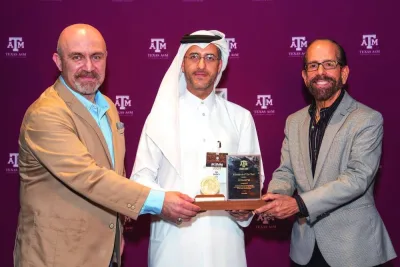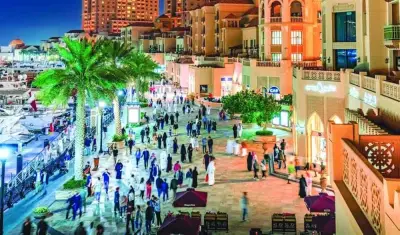The June 5, 2017 illegal siege on Qatar brought issues related to human rights, media and family ties in the region under the world’s spotlight. While Qatar’s diplomatic and media engagement amplified on the global stage, with serious policy drives that moved the country towards self-sufficiency, academics world over were also looking at Qatar, in part impressed by the mature diplomatic steps taken by the Qatari leadership in the aftermath of the sudden siege.
This also prompted a number of scholars and students to seek academic education in the Gulf. Many began applying at Qatar University’s (QU) Gulf Studies program, which is currently the world’s only program that provides an MA degree in Gulf Studies. In the year 2018, it saw a record number of student applications not only from international scholars, but an increasing number of Qatari students also showed interest in the politics of the region.
Speaking with Community, Dr Mahjoob Zweiri, Director of Gulf Studies Center at QU, said the Gulf Studies program provides a niche area of study.
“We see Gulf Studies as a unique niche to Qatar University. We are the only program in the world offering two degrees together – MA and a PhD in Gulf Studies. Having a research centre within the same context helps promote research, and allows students to actively publish research.”
Gulf Studies is also the only graduate program in social sciences and humanities in Qatar University. “That makes us unique on a national level. It also makes us unique because we are the only program offering this degree,” Dr Zweiri said.
The program was established in September 2011. “It is an interdisciplinary program by nature, focusing on the Gulf, its political, social, cultural, as well as security, energy, policy issues,” Dr Zweiri, who was among the founding members of the Gulf Studies MA program, said.
He said that the Gulf region was important for a number of reasons, including geo-politics of energy and the maritime issues. A third of the world’s sea-borne oil passes through the Strait of Hormuz — a strategically important strait between the Gulf of Oman in the southeast and the Arabian Gulf. The artery links the Middle East crude producers to key markets in Asia Pacific, Europe, North America and beyond.
“There is serious competition in the world to have good relations with the Gulf countries. This is also because the region hosts a large number of migrants from different nationalities. The stability of the region is not only a priority for us here but for the international community as well. The income of millions of workers goes to their home countries, and this has a serious impact on the development of their home countries. And so the significance of the region is not only for us within but beyond its borders as well.”
Dr Zweiri, an expert on issues of the Middle East and Iran, said there were multiple social, cultural dynamics, themes and topics of the Gulf that need to be looked at academically.
“There is movement between conservatism, liberalism, tribalism, and all of these phenomena are going on the region. These are issues, themes that need to be studied. And our students are writing on these issues as they study foreign policy, women, gender and society in the Gulf, its history and the impact of social media among a host of other area of subjects.”
In that respect, the Gulf Studies program in Qatar University is contributing highly to the knowledge about the Gulf, according to Dr Zweiri. “What makes it more important is that the knowledge is shared and written in English, so it becomes international and available to everyone. That also makes Gulf studies a niche and an important area of study in Qatar.”
Hessa Saad al-Muhannadi, Director of Legal Affairs at National Tourism Council and a PhD candidate in Gulf Studies PhD program, said the program added to her personal and academic knowledge. “I believe that it is essential to have Qatari experts and academics in the region that dedicate their research on topics related to the Gulf region,” Hessa asserted.
Asked about the impact of the Gulf crisis on the program, Dr Zweiri said, if anything, it further increased the significance of the program along with the number of student applications to the program. “In 2018, we saw the highest number of applications. In fact, we decided to raise the number of applications and accepted less than a third because of limited seats. There is growing interest in the region, not only from the outside from within the community.”
Dr Zweiri contributed this growing interest from students to the rich and open experience they receive at the program.
“We enrich student experiences by taking them to different places, engaging with Qatar locally, inviting decision-makers, and people who not only talk about politics but also arts, culture, gender, poetry and theatre.”
Every year at least 12 students are accepted to the program. In 2013-14, the Gulf Studies Centre (GSC) was established as a support to the program to focus on research, and it serves to consolidate the link between the program and the centre.
Later in 2015, the PhD program was established due to an overwhelming demand and interest.
“We have 60 students in the Gulf Studies program, 29 MA students, 31 PhDs, this includes nearly 30 different nationalities apart from the Qatari students. The academic team includes members from 9 different countries,” Dr Zweiri explained.
Last year, the program focused extensively on the ramifications of the Gulf crisis, with two major events including a conference last December and a student symposium where graduate and undergraduate students presented their research work on the Gulf crisis.
Dr Zweiri added: “The centre focuses on publications. We have three kinds, mainly monographs, Gulf insight and policy papers. We have published monographs on Qatar-Japan relations, Qatar-Latin America relations, Gulf insight on food security, among others. The centre is engaged with stake holders working with foreign ministry, providing expertise, facilitating research of faculty and students, and promoting collaborations within the university. We also organised an event on Iran to talk about nuclear Iran with Al Jazeera Centre.”
“In 2018, the Gulf Studies program was active in research and has 20 publications, and peer reviewed papers, as well as three books in the pipeline.”
Luciano Zaccara is an Argentina-born faculty that joined Qatar University’s Gulf Studies Centre (QU-GSC) in 2014 after working at Georgetown University in Qatar and passing by Exeter IAIS, and Madrid and Barcelona Autonoma universities. Due to his expertise on Iranian politics and elections in the Middle East and North Africa (Mena) region, he contributed to the centre in conducting research, organising several events and teaching Gulf and Iranian politics along 5 years.
“My experience at the centre was very rich in conducting fieldwork not only in Iran, where I had the chance to travel more than 10 times, but also in all the GCC states, with the exception of Saudi Arabia. It has been also enriching to interact with the GCC populations and to learn about their culture and traditions, as well as to contribute to their education through my courses, both at QU as well as at GU-Q.”
Meanwhile, Paulino Robles-Gil Cozzi, a PhD in Gulf Studies, said location is half the learning experience.
“I strongly believe in the comparative advantage of studying and analysing a region being in the region. Top universities can claim to have the best research, but to me, studying a remote region from a place which is totally different does not make much sense. Location is already half the learning experience, having first-hand sources, access to the symbols, everyday life, local culture and so on so forth, allows you to get raw data, precise information and a more accurate understanding of the area,” he said.
Paulino did his MA in Islamic Studies in HBKU, a two-year program plus an additional one year in which he did extensive fieldwork in Doha. Doing ethnography in this country triggered his interest in the Gulf as a region beyond Islamic Studies.
“The faculty team is making a tremendous effort to provide us with as many elements to better perform in our research projects which adds up to a multicultural committed community of research scholars that create an optimal environment. The Gulf region urges experts who can better comprehend and explain a complex region like this one. I am convinced that I am in the right place to do it. As a Latin-American, I benefit a lot from studying from a Global South perspective without the mediation of European or US institutions,” Paulino, who hails from Mexico, added.
Prof Nikolay Kozhanov, a visiting Associate Professor at the Gulf Studies Center, said he was positively surprised by the students and faculty at Gulf Studies program. “I was pleasantly surprised by the active discussion and interesting research projects on issues of Islam, culture, and other political issues.”
Kozhanov is also an Academy Associate with the Russia and Eurasia program of Chatham House and Associate Professor at the European University at St Petersburg.
“The program is very impressive and unique in terms of its location. Our students have direct access to the region and its people. Gulf studies in Qatar versus that in the UK is different because here, students are engaging with the very fibre of the society.”

ADDRESS: Dr Hassan al-Derham, President of Qatar University, speaking at The Gulf Studies Center Third Annual International Conference.


